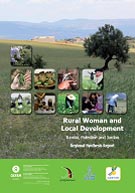Rural women and local development : regional synthesis report : Tunisia, Palestine and Jordan (2013)

The research conducted for the “Rural Woman and Local Development” study has been designed as part of the Regional Economic Empowerment of Woman Project (REEWP), which aims to provide rural woman with an environment conducive to sustainable economic development.
The main objective set for this study was to provide support to woman’s economic empowerment in the region, in general, with a specific focus on the situation and conditions of rural woman in Tunisia, Palestine and Jordan, in particular.
Towards these objectives, researchers in each of the three countries prepared a detailed, qualitative study on ‘Rural Woman and Local Development’ in the three areas of WadiSbaihia in Tunisia, Khalidyain Jordan, and Asira ash-Shamaliyain Palestine.
A comparative approach was adopted in this study in order to better understand the interdependencies between rural woman’s conditions and local development, and to produce more in-depth knowledge on the fundamentals and the mechanisms that impact woman’s empowerment.
This approach also aims to allow for analyses that more closely links local development to contributions and benefits. At the macro-level, the three reports present an overview of rural woman’s participation by addressing the more general economic and political conditions that impact the rural areas under examination.
At the micro-level, the reports present the specific factors impacting these rural woman, in an attempt to better understand mindsets, incentives and obstacles in the path towards economic empowerment, while extrapolating conclusions on the changes that are occurring, and have already taken place, and to better understand processes such as identity-building and decision-making.
The research was conducted according to two interdependent focuses: the socio-economic, which provides an analysis of the economic empowerment of rural woman relative to the manner in which they interact with local development, according to a gender-based evaluative approach; and, the socio-anthropological, which seeks to study the relevant groups in the three areas selected for the samples used in this study.
Finally, another major objective of this research was to provide those working on implementing the REEWP a clear and operative set of qualitative and quantitative indicators, specific to rural woman and to gender in the areas under study.
Return Download
